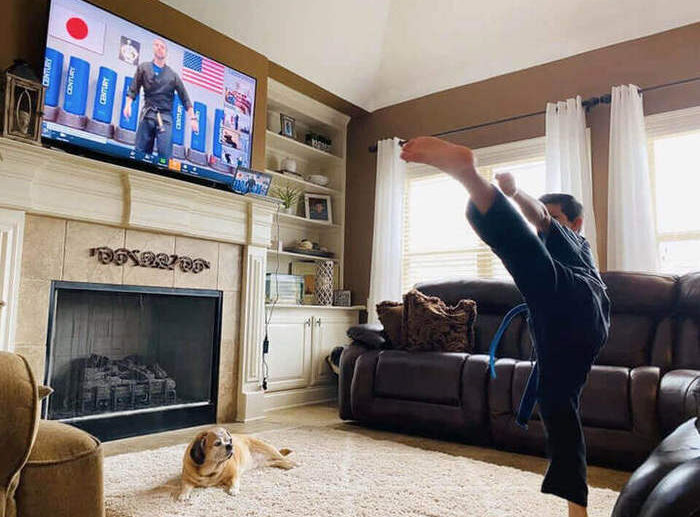
Did you hear about the guy who was in a coma for the last year? He asked if someone wanted to Skype.
In case that was you, Zoom is now a Noun, a Verb and the biggest thing since beepers. It’s the teaching platform Action Karate uses every day for our martial arts classes as we’ve weaved in and out of lock-down. Zoom classes have remained.
After a year of Zoom, we’ve learned a lot. No matter what you are teaching on Zoom, whether it’s second grade or knitting, here are some tips that will help you sound like a video star.
9 Black Belt Tips for Teaching on Zoom
- Say names frequently – Ask participants to ‘Rename’ themselves what they want to be called, and refer to them by name frequently. Things like walking over to someone or making eye contact don’t work on video. Acknowledging them is the best way to keep people engaged.
- Include a second instructor whose job is to watch class – In Action Karate, that second instructor is a paid, certified, trained teacher giving feedback to each student. If you don’t have enough instructors, we also have other students take turns giving feedback and giving praise and corrections to their peers.
- Have a back-up plan for technology problems – I always have a phone nearby also signed into the class so that if the laptop drops, I can quick switch devices. Don’t wait until one device glitches to log in on the other. Just make sure the volume is turned down on one unless it is needed. Even better is to have another instructor logged on somewhere else who can pick up where your wi-fi left off.
- Include activities looking away from the camera – Staring at a screen is bad for your eyes and for your focus. Encourage people to look away from the screen – whether they are looking at a book, their own hands, or a piece of paper for notes. Do this frequently. There are tons of interactive transitions. I really like scavenger hunts for kids. (Go find something that starts with the letter b)
- Assign a physical movement to every part of class. It is boring to sit there and listen to someone talk, especially during a physical class. Kids are more engaged if they are doing arm circles, or standing on one foot. It shouldn’t be complicated like a jump spin but a physical movement is helpful.
- Forget about left and right. In a room full of people, facing them, we use the “mirror” technique – I say left but use my right. On video it is so confusing. For martial arts, it has been a distraction to learning. It’s better to say “other side.” Or use a “clock” visual – turn to 12, 3, 6 or 9.
- Share a video or text on screen to illustrate your teaching. The “share screen” feature is awesome – you can share anything. If you were doing a presentation, what visual would you use? Something on YouTube will help and make it more memorable.
- Forget about getting audio input – Mute everyone. It is the worst noise to let people stay unmuted. Only unmute one person at a time as needed.
- Can you hear me now? You’re trying to demonstrate, move around, get a good camera angle, and in the end, the volume suffers. Get a good microphone. It’s worth it for the audio to come through clean no matter where you are standing. Your instructions should be so clear that someone could take your class even if they can only hear, not see you. They should be able to follow along without moving their ear closer to the speaker, both in terms with how clear your voice is and the clarity of your directions.
